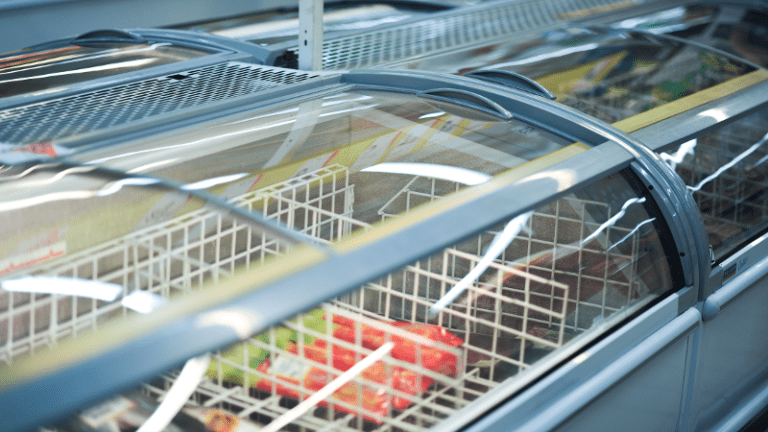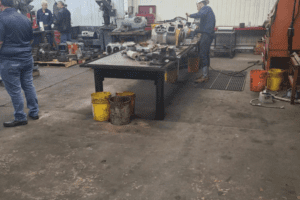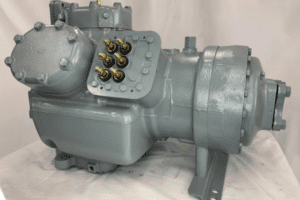When you’re working with a commercial refrigeration system, it is crucial to know what all the different parts do. Among the components of commercial refrigerators, one stands out as most important: The commercial compressor.
The commercial compressor has often been called the “heart” of a commercial refrigeration system. It does some of the most vital mechanical work that takes place within the system. If any other components wear out or become damaged, it is the compressor that works the hardest to compensate.
Likewise, if the compressor stops working, the whole system will grind to a halt.
So, what exactly is a commercial compressor?
There are lots of commercial compressor myths, but it is fairly easy to understand.
Why a Commercial Refrigeration Compressor Is Important
The job of the commercial refrigeration compressor is to compress the refrigerant gas. No matter what type of refrigerant you use, it needs to be compressed to reach an appropriate pressure. Pressurization makes the gas available to the rest of the system, facilitating the cooling process.
The compressor features as one of the biggest considerations in any commercial refrigeration system. It is also essential to commercial HVAC setups. In a commercial HVAC, the compressor is responsible for both the cooling and the heating function – both surprisingly similar from an engineering perspective.
Although they are usually made by the same companies, commercial refrigeration compressors vary a great deal from those used in HVAC system. Each compressor is designed to specific tolerances that will work within a given system under a specific demand and in a particular environment.
Once the right commercial compressor has been selected, its care and maintenance is an ongoing concern for the life of the system. Applying an appropriate maintenance routine helps ensure you can get years of reliable work out of your commercial compressor.
Today’s compressors are lasting longer and performing more efficiently well into their service life. That said, maintenance is indispensable. Likewise, a facilities manager in any industry should have a plan to replace the compressor when age leads to reduced performance.
Commercial Refrigeration Compressor Facts You Must Know
Despite how vital it is in your refrigeration system, a commercial compressor is not necessarily hard to work with. Over the years, companies from the United States and all around the globe have improved compressor technology. Today’s compressors couple superior output with fewer points of fault.
That said, the refrigeration compressor has a certain mystique that has led to some misunderstandings.
Here are some of the most useful things to know about commercial refrigeration compressors:
1. A Problem with Your Refrigeration System Does Not Always Mean the Compressor Is Faulty
“When in doubt, look at the compressor” is an idea left over from old-fashioned reciprocating compressors that took on a lot of wear and tear due to the constant action of their pistons. Even today’s reciprocating compressors are much more reliable. Most problems do not originate in the compressor.
When evaluating a refrigeration system issue, the first thing to check on is usually the simplest and easiest to overlook: The presence of enough refrigerant. From there, look at any complex electronic elements, which may become inaccurate as internal components wear out.
2. Bigger Does Not Always Mean Better When It Comes to Your Commercial Refrigeration
Sizing your compressor accurately for your system is the most effective way to both prolong its life and save money on its energy costs. Purchasing a larger refrigeration compressor than you actually need will lead to waste. For larger models, partial load operation can help you capture significant ongoing savings.
If you are replacing a compressor, it is almost always the case that you should get an identical model from the same manufacturer you started with. Only consider changing your compressor if there has been an increase in the demand on your system.
3. Replacing Your Compressor Does Not Need to Be Expensive
Compressor replacement is an inevitable fact of life for any enterprise that relies on its refrigeration systems. Understand just how long your compressor is expected to last and have a contingency plan in place as it reaches the end of its service life. This will save you plenty of time, money, and aggravation!
Many people look at OEM-affiliated wholesalers as their first stop for a replacement compressor. Sadly, this often means paying a premium for the remanufactured compressor with a brand name tag but no real gain in quality. A remanufactured commercial compressor will perform equally well and comes to you at a significant discount.
In remanufacturing, the entire compressor unit is dismantled and inspected. Any needed replacements are made, along with cleaning and other maintenance. At every step, tests are conducted to ensure the remanufactured compressor meets all performance and environmental standards. By cutting weeks off your procurement timeline, remanufactured products help you bounce back from any compressor failure.












